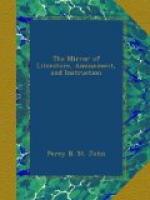M.S.P.
* * * * *
STEAKS.
People who want to enjoy a steak should eat it with shalots and tarragon. Mr. Cobbett says, an orthodox clergyman once told him that he and six others once ate some beef-steaks with shalots and tarragon, and that they “voted unanimously, that beef-steaks never were so eaten before.”
* * * * *
FINE ARTS.
* * * * *
THE CAT RAPHAEL.
Gottfried Mind was born at Bern, in the year 1768. His father, but a short time before, had come in the capacity of joiner and form-cutter into Switzerland from Lipsich, in Upper Hungary, and had fixed his abode at Warblaufen, a village near Bern, where he was chiefly employed for the paper-manufactory of one Herr Gruner, and soon after his arrival purchased the freedom of Pizif, in the Waadtland. Young Mind, on account of his weak constitution of body, was in great measure left to himself, perhaps in the hope of making him healthier and stronger by the cheap and easy means of idle running about. Herr Gruner was a lover of art; during summer he had a German artist, named Legel, in his house, a talented and active man, who often, in country excursions, drew buildings and cattle from nature. This excited the attention of young Mind in some of his idle rambles: he followed Legel every where, and watched him while he worked. Legel, touched with compassion for the poor boy, showed him what he was engaged with, or what he had already finished; and, in the end, would take him along with him in his walks, or amuse him in his own apartment with exhibitions of prints. In particular, he allowed the boy, as often as he liked, to turn over Ridinger’s Animals, of which Herr Gruner had a collection; and some of these Mind was not long in trying to imitate with the lead pencil, preferring above all lions, which continued long his favourite animals. These attempts Legel from time to time corrected, and, from less to more, the youngster at length ventured to copy from nature, like his master, and to draw some sheep, goats, and cats.




